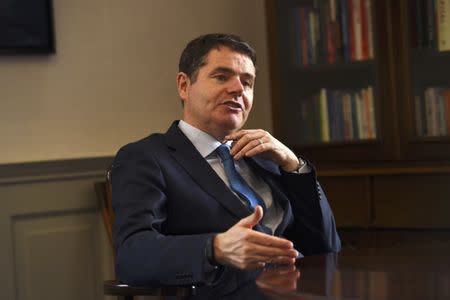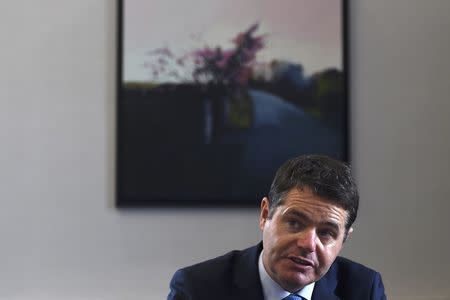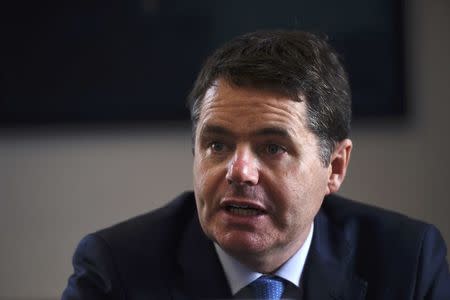Ireland cuts 2016 GDP forecast ahead of 'Brexit-proof' budget
By Padraic Halpin DUBLIN (Reuters) - Ireland has shaved 0.5 percent off its growth forecast for 2016 as well as 2017 ahead of a budget due next month that will aim to "Brexit-proof" the economy from further damage, the minister for public expenditure said on Thursday. Ireland is considered especially vulnerable to the knock-on effects of Britain's decision to leave the European Union due to their close trade ties, even though the export-focussed Irish economy has staged a strong recovery after completing an international bailout in 2013. Dublin had predicted gross domestic product growth of 4.9 percent this year and 3.9 percent in 2017 before Britons voted in a June 23 referendum to quit the EU - a move that prompted Irish Finance Minister Michael Noonan to flag a likely 0.5 percent cut in the forecast for next year. Public Expenditure Minister Paschal Donohoe told Reuters that Noonan had brought updated forecasts to the cabinet this week that confirmed an identical hit for 2016. While this does not impact Ireland's budgetary plans for 2017 and 2018, it could reduce the 9.1 billion euros (7.81 billion pounds) of so-called "fiscal space" earmarked for tax cuts and spending increases for the following three years, Donohoe said. "We can't quantify what that is yet for two reasons. The first one is, we have to be very careful looking at forecasts for 2019, 2020, 2021 and beyond, given the uncertainty there at the moment," Donohoe said in an interview. "The second reason is we are trying to put in place measures that might mitigate some of the growth shock that we might face because of what's happening with Brexit ... - measures to grow the productive capacity of our country in the mid-term to act as a buffer to the inevitable challenges our economy will face." Donohoe and Noonan are therefore examining how their Oct. 11 budget for 2017 can "Brexit-proof" the economy. CHALLENGES Spending requests from ministers seeking extra funds for state industrial bodies or concerned about the impact of the weakened British pound on exporters are all being anchored around Brexit, Donohoe said. For this reason Donohoe said he had committed 43 percent of all capital spending till 2021 to July's plan to tackle Ireland's chronic housing shortage because larger cities "will not have the ability to grow in line with their potential" without it. Donohoe said similar infrastructure deficits after years of underspending meant that if fewer funds were available in future years than expected, he would favour prioritising capital spending over current spending or tax cuts. The government increased its capital budget for the next six years by almost 20 percent in June - just before the Brexit vote - when Donohoe said he would consider an even higher level of investment at a review due next year, depending on economic growth. On Thursday he said any further increase was unlikely. Some clarity on Britain's intentions regarding its future relationship with the EU's single market would greatly help that kind of planning but, regardless of the nature of Brexit, the consequences for Ireland will be difficult, Donohoe said. "I approach all these (budget) discussions with the mindset of 'we're going to have challenges'. What we are working to quantify is the magnitude of those challenges," he said. British Prime Minister Theresa May has said she will not invoke Article 50 of the Lisbon Treaty that launches divorce proceedings before 2017. She has given no details on Britain's negotiating position but British media have speculated that the country could leave the EU's single market, a scenario likely to harm its trade ties with the bloc, including Ireland. (Editing by Gareth Jones)













